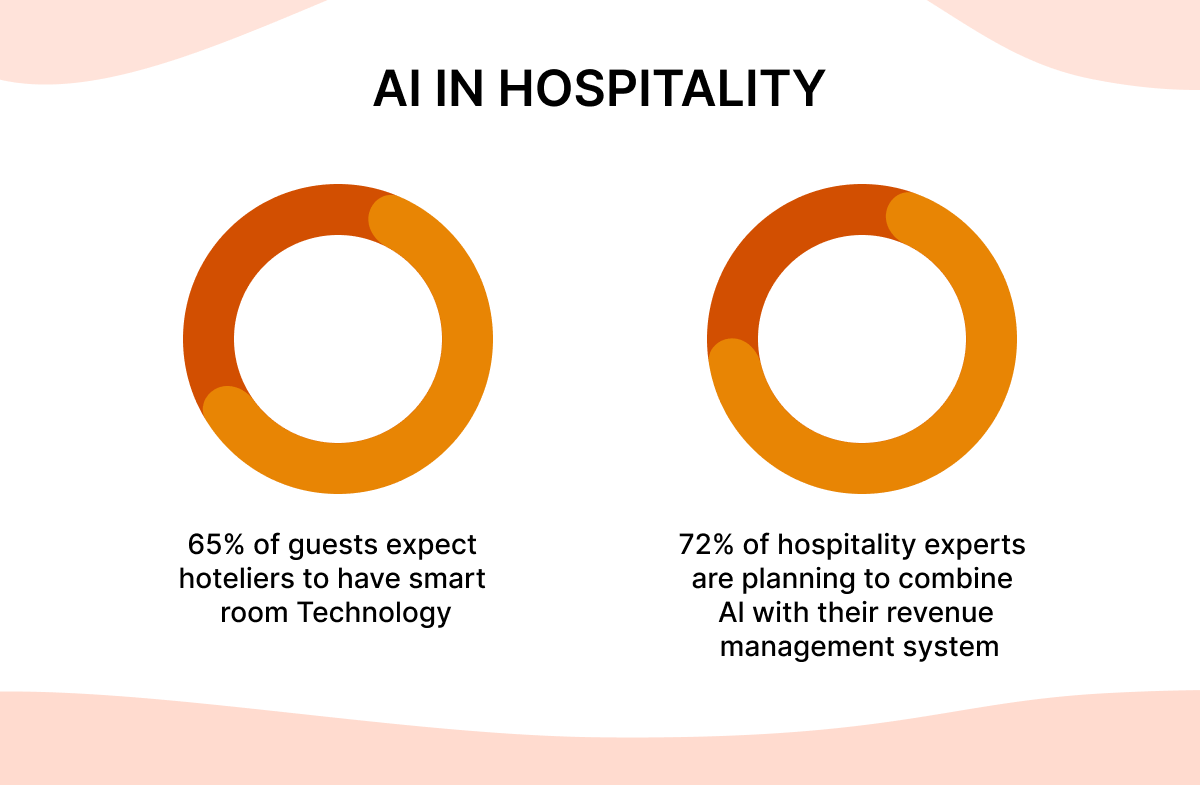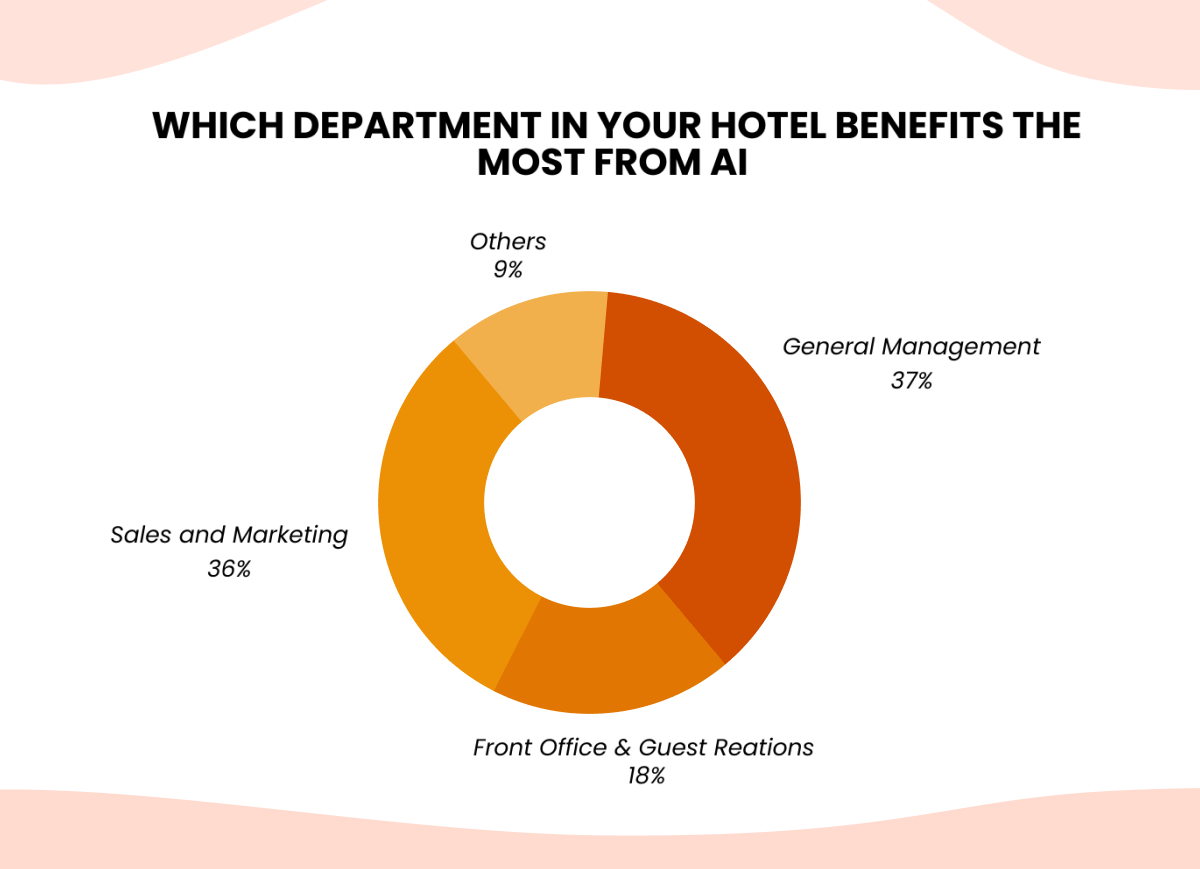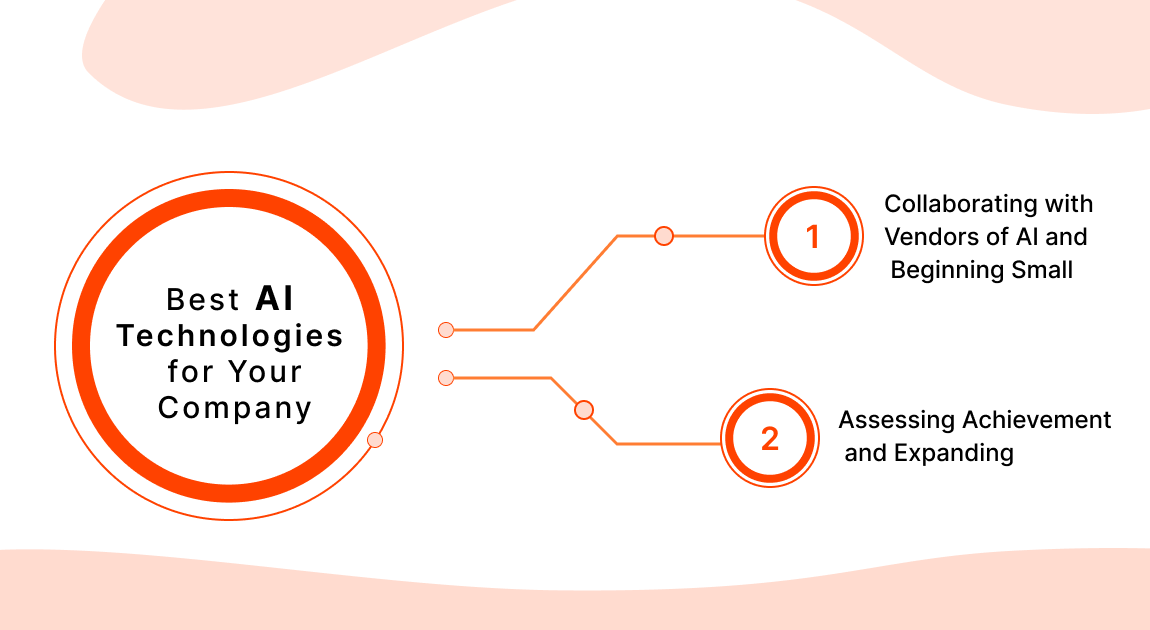The Role of AI in Hospitality Industry: Understanding the Growing Importance of AI in Hotels

Initially, hospitality is more about human interactions and personalized service than technological solutions. However, hotel industry organizations have partnered closely with technology since their inception. The first centralized reservation system was established by Hilton Hotels in 1946, and it soon became the industry standard for ease and something visitors expected to see in every hotel. It follows a straightforward pattern: hotels adopt new technology as it becomes available, and soon enough, you’ll need to accommodate their needs in order to continue operating. Artificial Intelligence (AI) is now the most significant and discussed technological topic. As AI in hospitality has many advantages, businesses in the hotel sector are using it more and more.
Regardless of your current level of understanding of AI development, it’s a competitive advantage that you should at least grasp if not fully embrace. This blog post aims to do just that: to define artificial Intelligence (AI), outline its benefits for your company, and showcase its most successful applications. What does artificial intelligence (AI) look like in the travel and hospitality industry today, and what potential does it hold for the future?
What Is Artificial Intelligence?
To begin with, artificial Intelligence (AI) is the process of teaching a computer system to think and learn like a person using vast amounts of data. Artificial Intelligence (AI) systems are capable of doing complicated tasks that conventional software cannot due to their ability to think, learn, solve issues, and make judgments. The development of AI has led to several advances in the hotel industry, including chatbots, analytics systems, and other software solutions that tailor client experiences and increase profitability.
Automation and artificial Intelligence are closely related in the hospitality sector. AI-powered software can handle repetitive and time-consuming jobs, freeing up your staff members’ time for customer care and other crucial business areas.
Unveiling the Benefits of AI in Hospitality Sector
According to PwC, Artificial Intelligence could potentially boost global GDP by $15.7 trillion by 2030. Other IndustryARC projections indicate that by 2026, the travel and hospitality AI market may be worth more than $1.2 billion, with hotels and resorts using AI to boost revenue and enhance operations. The application of AI in the hospitality sector undoubtedly holds significant value, but what specific benefits can your business expect? Let's explore.
Improving the Client Experience
AI technology in the hotel sector is revolutionizing visitor interactions, leading to a more delightful and stress-free stay. With voice commands, smartphone applications, or interactive room displays, guests can now control room amenities and access comprehensive information about hotel features, nearby attractions, and suggested restaurants and activities. By leveraging AI software development to power guest experiences, hotels can provide the seamless, highly customized stay that guests have come to expect, opening up a world of exciting possibilities.
Optimizing Processes and Productivity
Hotels and resorts often need help maintaining consistent service standards and tailoring client experiences while controlling operating expenses. 82% of enterprises in the hospitality sector report workforce shortages. Artificial intelligence solutions relieve the workload on overworked teams and address efficiency issues by taking over routine jobs, which are often repetitive and time-consuming. AI also enhances cost-savings and efficiency by streamlining operational procedures.

Creating Forecasts and Insights
Artificial intelligence (AI) solutions gather information from several sources, including property management systems, point-of-sale systems, and direct guest interactions, and transform it into insightful suggestions. These insights allow AI hotels to improve operational procedures, anticipate visitor demands, reduce hazards, and identify trends. For example, with AI projecting an increase in demand for wellness tourism, you can better prepare for the trend and extend your services with yoga gateways or health-focused cuisines.
Customization on a Large Scale
In the past, one-on-one encounters were the primary source of customization in the hotel industry, but they could have been more scalable. This whole dynamic is altered by the use of AI in the hotel sector. Hotels can now accomplish customization at scale using AI-powered solutions. Hotels may respond to reviews from guests in a customized way, prioritize urgent requests, and provide appropriate upsell suggestions utilizing a system that remembers every guest’s preferences, from preferred room temperatures to previous activity selections. Ai enables you to do more, better, and with fewer human resources by handling thousands of requests and several tasks at once
Exploring Critical AI Applications in the Hospitality Industry
In reality, tourists cannot see artificial Intelligence (AI) in the hospitality sector since, contrary to popular belief, AI is mainly used on the backend of hotel operations, not as a humanoid robot serving beverages. Large chain hotels do, in fact, use robotic concierges powered by AI; nonetheless, businesses find more benefit in applying AI to less glamorous but still essential domains. Here are some more detailed instances of AI in hospitality business.
Chatbots for Customer Service Driven by AI
In the hotel sector, using Chatbots or automated messaging to provide front-facing customer care is the most apparent use of Artificial Intelligence. These AI-powered digital solutions may be implemented on any platform (your website, app, social media, etc.) to help visitors make requests, reserve hotel rooms, or learn more about your offerings. The most significant part is that AI chatbots are available around the clock to assist and support your visitors.
AI for Both Arrivals and Departures
AI expedites the check-in procedure by using face recognition or smartphone applications, enabling visitors to skip the front desk and go directly to their rooms. In a similar vein, AI-powered self-service kiosks streamline checkout processes and provide this service around the clock. The hotel sector is adopting AI to cut down on wait times and provide customers with a more seamless, easy experience. At the same time, employees are free to provide high-touch services rather than getting bogged down with front-desk paperwork.
Dynamic Pricing and Revenue Management
Artificial Intelligence gives revenue management, the art of optimizing hotel profitability, a high-tech boost. Revenue management in hotels is regarded as the most effective use of Artificial Intelligence, with visitor satisfaction exceeding 60%. You may depend on AI systems to assess market trends, rival pricing, and historical data to modify rates and increase income rather than reading spreadsheets. It helps you provide competitive pricing so you won’t miss out on possible visitors, making it one of the compelling AI examples in the hospitality business.

Customized Advertising and Suggestion Systems
Adding more human elements to marketing initiatives is an excellent approach to increase consumer engagement, and AI is ideal for this. AI hospitality software may provide personalized marketing messages and suggestions by examining visitor data from previous visits, preferences, and internet activity. AI may recognize a guest’s preference for relaxing at the spa and email them a special spa weekend offer if they share this interest. Making tailored recommendations and converting visitors into devoted ones would be much simpler with Artificial Intelligence.
Integration of IoT and Smart Rooms
Using AI-powered IoT devices and sensors, intelligent hotel rooms provide customers with a more enjoyable stay. Voice-activated digital assistants that can be integrated into any gadget may customize lighting and temperature settings based on visitor preferences. They can also activate TVs, place room service orders, and more. AI in the hotel sector may also monitor and manage lighting and HVAC systems depending on occupancy levels, which lowers expenses and promotes sustainability.
AI for Menu Planning and Kitchen
Artificial Intelligence is quite good at listing potential dietary restrictions on the brunch menu for tomorrow. Utilizing artificial Intelligence, restaurants may tailor meal suggestions to each customer’s unique preferences and nutritional needs by learning about their distinct tastes, such as their favorite vegetarian or extra-spicy menu items. Chefs may prepare dishes that satisfy palates while also putting guests’ health and happiness first by using AI to analyze regional tastes and culinary trends.
Challenges with AI Implementation in the Hospitality Sector
Without question, AI has the potential to improve profitability in the hotel sector significantly, but there are hazards and difficulties to be mindful of.
Data Security and Privacy Concerns
Since artificial intelligence technology depends mainly on data, this is its most significant obstacle. The enormous amount of personal data that AI systems gather, including interests, habits, and perhaps sensitive information, may worry guests. Data breaches, cyberattacks, and improper personal data use are frequent occurrences in today's world.
Relevant AI specialists advise doing this: To allay these worries, hotels need to take solid security precautions (e.g., data encryption, frequent system audits, personnel training, etc.) and be open about their data-gathering procedures. Clear communication and data privacy regulations also ensure guest comfort and the effective use of AI technology.
The Balance Between Automation and Human Touch
The hotel business needs human interaction and touch, even while AI may automate processes and boost efficiency. Many visitors still cherish the warmth and one-on-one interaction that comes from speaking with hotel employees face-to-face. Moreover, hotels need to strike the correct balance since relying too much on automation might result in a cold, impersonal atmosphere.
Relevant AI specialists advise that to preserve the emotional and connection spark, you may use technology to automate simple jobs that don't need a lot of human contacts and leave more complex work to human resources. Sometimes, while you're searching for an answer, people will appreciate your attitude more than the answer itself.
Important Domains in Which Hotels Can Use AI
AI is upending the hotel industry in several application cases.
Redefines the Experience of the Customer
Contemporary visitors need prompt responses to their questions. That’s why hotels need natural agents available around the clock to respond in a human-like manner, address often-requested queries, and provide customized services as required.
As a result, the front desk employees have more time to concentrate on raising visitor happiness.
Due to their ability to speak several languages, hospitality chatbots may take reservations, communicate with customers in their own tongue, and provide booking-related confirmations.
Through cross-selling and upselling, hotel chatbots assist you in generating supplementary income.
They may assess guests' preferences and send tailored offers, such as spa appointments or food and beverage discounts, to guests throughout their stay or even before they arrive at your hotel.
These AI chatbots have natural language processing (NLP) skills, so they can comprehend visitors' communications and provide hotels with information about their experiences.
Determining Prices
According to a PWC research survey, over 72% of hotel industry specialists want to integrate AI into their revenue management systems.
Hoteliers may use AI to develop dynamic pricing plans. These plans may take into account various criteria, including rival pricing, historical data, client preferences, and market demand, allowing hoteliers to optimize their income.
This implies that businesses may increase income per available room by setting real-time hotel pricing.

Demand Analysis
With real-time booking data, AI enables hospitality workers to maximize every hotel room, which is revolutionary.
These clever algorithms take into account real-time booking data when allocating rooms, ensuring that no space is unused.
Additionally, AI-powered solutions guarantee smooth connection with OTAs, giving hotels additional chances to generate income.
These systems provide time items that offer real-time updates to pricing OTA channels. Hoteliers will always take advantage of an opportunity to seize potential in this manner.
For example, our AI-powered hospitality solution, Channel Manager, effortlessly manages room pricing and availability across several OTA platforms without requiring human participation. With just one dashboard, you can adjust prices once and view them instantly on more than 100 OTAs.
Allows for Customization of the Room
By customizing visitor preferences, hoteliers may elevate an average room to a bright hotel room. AI gathers and learns from data, including past visits and online interactions, so it is aware of visitors' likes and preferences and can modify the lighting, temperature, and mood of the area accordingly.
Even customers who are tact-aware choose to stay at hotels with smart room amenities. According to a survey, smart room technology is becoming increasingly important, so it should come as no surprise that 65% of visitors anticipate seeing it.
Hotels may improve their environmental sustainability with the use of AI algorithms.
For example, smart sensors can optimize the room's energy use and modify the temperature when a visitor enters, responding to the outside weather.
Analytics for Predictive
Predictive analytics aims to gain insightful knowledge about visitors' behavior and interests. Additionally, AI aids in predicting visitor demands to provide memorable visitor experiences.
These days, hotels use robots to verify guests’ identities, expedite check-in and checkout procedures, and deliver information about guest facilities, all while freeing up the front desk workers.
According to a hotelier poll, 37% of hoteliers think that using AI is most beneficial for the front desk function.

Service robots improve the visitor experience.
Draw In and Keep Competent Personnel
AI benefits hotels in more ways than just visitor satisfaction; it also helps with personnel management.
It improves the recruiting process by automating repetitive processes, reviewing resumes, and determining whether individuals are worthy of an interview.
Because they take on less work, these intelligent algorithms increase the productivity of the current human workers.
Additionally, an AI-powered property management system (PMS) provides a dashboard with an easy-to-use interface, which makes it easier for you to manage your hotel's front desk operations and cleaning procedures.
You may teach staff members at your hotel and provide them with immediate feedback by implementing an AI-based effective training program.
Putting AI to Use: Expenses, Return, and Employee Education
Certain upfront costs are associated with using AI in the hotel industry, and calculating a return on investment may be difficult. Factors like staff training and data integration might raise the initial expenditure in addition to the cost of the technology itself.
Relevant AI specialists advise carrying out in-depth cost-benefit evaluations and giving top priority to solutions that provide a definite return on investment. To prove value and create a case for more funding, stick to a phased deployment strategy and begin with AI applications that provide immediate benefits. It's critical that AI technology in the hospitality sector be used correctly to improve staff comfort and readiness and provide a guest-centric experience.
How to Choose the Best AI Technologies for Your Company
The technology you choose will significantly impact how successfully your AI system works with the current infrastructure, provides value to your visitors, and eventually enhances hotel operations. Therefore, in order to make the best decision, carry out an in-depth study, speak with AI specialists, and maybe launch trial projects to verify efficacy and compatibility prior to widespread adoption. The AI software should complement your company's demands and the particular problems you want to solve, which is another important consideration in this regard.
Collaborating with Vendors of AI and Beginning Small
With the aid of an AI development company's experience, you may make sense of your alternatives and create or modify an AI system that will seamlessly work with the infrastructure of your current hotel. Remember that it's okay to start small and not go in headlong. Analyze the effects of a pilot program using artificial Intelligence in a particular area, such as housekeeping or guest relations. Starting with modest, manageable tasks enables you to safely move up, see measurable outcomes, and alter strategy based on input from the real world.

Assessing Achievement and Expanding
After your pilot program is operational, it's time to assess its effectiveness. Monitor essential indicators such as income produced, visitor happiness, and operational effectiveness. When you see the desired results, it's time to expand! Use the lessons you learned from your pilot to extend the use of AI to further departments. Keep in mind that AI is an ongoing learning process. Thus, the system will become more innovative and influential as more data is collected.
AI in the Hospitality Sector: Crucial Lessons - Conclusion
There's no denying that artificial Intelligence has made some really astounding advancements in the hospitality sector so far. And that's just the tip of the iceberg when it comes to our current understanding of artificial Intelligence's potential.
Although AI is a relatively new technology, you should be bold and use it if you do your homework and find a suitable technology partner. As a hotelier, artificial Intelligence presents an opportunity to boost efficiency and enhance guest experience rather than posing a danger.
Hire our AI developers if you wish to use intelligent software solutions to enhance your bottom line and tailor the visitor experience. We'll work with you to develop the ideal solution and a successful AI strategy and to optimize the advantages and return on investment of specially designed intelligent software.
Frequently Asked Questions
How is AI being used in the hospitality industry?
AI is used in the hospitality industry to enhance guest experiences through personalized services, automate check-in and check-out processes, optimize revenue management with dynamic pricing, and improve operational efficiency through chatbots and virtual assistants. It also enables predictive analytics for better decision-making and customer insights.
What is the best AI for hospitality?
The best AI solutions for hospitality include AI-powered chatbots for customer service, revenue management systems that utilize predictive analytics, and personalized recommendation engines that tailor services to individual guest preferences. Solutions like Hilton's Connie and YOTEL's robotic services exemplify effective AI applications.
Will AI replace hospitality?
AI is unlikely to replace human roles in hospitality entirely, as it cannot replicate the emotional intelligence and personal touch that define the industry. Instead, AI will augment human efforts by automating routine tasks, allowing staff to focus on providing personalized guest experiences.
What does AI mean in hotels?
In hotels, AI refers to the use of artificial intelligence technologies to enhance guest experiences, streamline operations, and improve service delivery. This includes applications like chatbots for instant assistance, smart room technologies, and data analytics for personalized marketing and revenue management.
How to use AI for hotels?
Hotels can use AI by implementing chatbots for customer service, utilizing predictive analytics for pricing strategies, automating check-in/check-out processes, and employing smart room technologies to enhance guest comfort. AI can also help in data analysis to understand customer preferences and optimize operations.
How big is the AI in the hospitality market?
The AI market in hospitality is projected to exceed $1.2 billion by 2026, with a compound annual growth rate (CAGR) of over 9.7% from 2021 to 2026. This growth reflects the increasing adoption of AI technologies in the industry to meet evolving guest expectations

Yogesh Pant
Yogesh Pant is a CEO and founder of Mtoag Technologies, a Top mobile app development company specialized in android and iOS app development.
Subscribe Us
Join fellow entrepreneurs! Get Mtoag' latest articles straight to your inbox.


